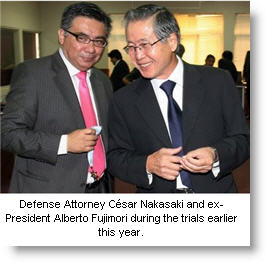Peru’s Supreme Court began today to evaluate ex-president Alberto Fujimori’s appeal to annul the verdicts handed down to him earlier this year, for the Barrios Altos and La Cantuta murders, and in the corruption and kidnapping trial.
Fujimori’s attorney, César Nakasaki, is requesting to annul the 25 year sentence given to Fujimori in April this year, for sanctioning a paramilitary death squad that killed 25 people in two notorious massacres during the first two years of his 10-year authoritarian rule.
Although Fujimori was not directly involved in these crimes, there was sufficient evidence that he knew and approved of the operations. The trial was conducted impeccably and the verdict was considered a paradigm in the hemisphere.
The second appeal is for the sentence of 20 years given for corruption (paying Vladimiro Montesinos $15 million just before Montesinos fled the country in 2000) and the kidnapping in April 1992 of journalist Gustavo Gorriti and businessman Samuel Dyer.
Victor Quinteros, a researcher at the Universidad Catolica’s Human Rights Institute, believes that Nakasaki’s argument in his appeal against the kidnapping verdict may possibly focus on the fact that President Fujimori called for a State of Emergency when he closed the Congress in April. This legal state effectively put the military in charge of domestic security and allowed them to carry out arrests and house searches at their discretion, and therefore holding Gorriti and Dyer was within the bounds of legal action.
In the Barrios Altos and La Cantuta trials, Quinteros doubts there will be any reconsideration. The basis of the prosecution and the sentence, Quinteros said, was that “there is no Cantuta without Barrios Altos, no Barrios Altos without Colina (death squad), no Colina without the National Intelligence Service (SIN), no SIN without Montesinos as its de facto chief, and there is no –nor could there be- Montesinos without Fujimori. In conclusion, all roads lead to the SIN and to the authority over this organization executed by Montesinos, and based on the decision and full support of his only hierarchical superior, former President Alberto Fujimori.”
 The first two days of the three-day process are being taken up with Fujimori’s appeal and the prosecution’s rebuttal. The third day will be for Judge Duberlí Rodríguez Tineo and his court to deliberate and give their decision.
The first two days of the three-day process are being taken up with Fujimori’s appeal and the prosecution’s rebuttal. The third day will be for Judge Duberlí Rodríguez Tineo and his court to deliberate and give their decision.
Nakazaki says he will give a hard battle but also expressed skepticism on the court’s impartiality. “We consider that the Supreme Court magistrates obey an ideology that seeks to bury ex-President Fujimori through a series of arbitrary and condemning sentences,” he said.





